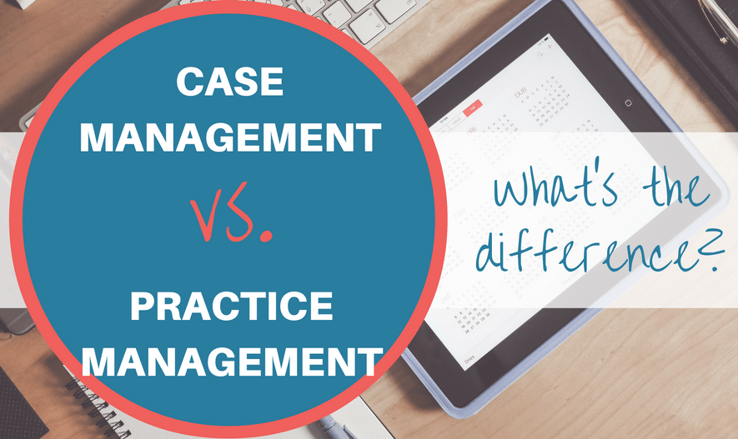
Having been on both sides of legal tech - both as a consumer when I was practicing and now as a producer as a founder of CaseFleet - I have learned a great deal about the different solutions that can help lawyers run their practice more efficiently. But one of the questions I've struggled to receive a satisfactory answer to is this: What is the difference between case management and practice management?
The real issue stems from the fact that the terms "case management" and "practice management" have been used synonymously in the legal tech world, and we continue to muddy the waters by not differentiating between the two. Even the ABA lumps both practice and case management together, and most legal tech vendors can't seem to decide which camp they want to fall under, describing themselves using both terms interchangably, which only adds to the confusion.
So is there a difference between case management and practice management? I believe there is. I also believe that legal tech vendors have a responsibility to clarify the distinction between the two, so as to help the legal community as a whole. By being able to understand the differences between practice and case management will only serve to help law firms find a solution that meets their unique requirements.
 Here in the U.S. the term "case" is used for legal disputes between parties. So at the risk of over-simplification, imagine case management as a digital version of the traditional, physical case file. It primarily serves the function of litigation support in that case management's primary purpose is to keep all the information of a case or legal matter organized. This is particularly essential in litigation, whether the dispute ripens into a court case or not and every single detail of a case is reviewed and scrutinized over and over again.
Here in the U.S. the term "case" is used for legal disputes between parties. So at the risk of over-simplification, imagine case management as a digital version of the traditional, physical case file. It primarily serves the function of litigation support in that case management's primary purpose is to keep all the information of a case or legal matter organized. This is particularly essential in litigation, whether the dispute ripens into a court case or not and every single detail of a case is reviewed and scrutinized over and over again.
There's no denying that as time progresses, legal cases are becoming more complex. In this Digital Age, more data is available to us than ever before. Thus, attorneys are experiencing a growing collection of details piling up for every case which must be catalogued and organized for logical presentation in the court room.
A lawyer must keep up with all the important facts of each case, such as important witnesses, relevant issues, key pieces of evidence, legal deadlines, and so much more. From a legal tech perspective, this means that case management software should provide a central location where all case information is easily accessible and where any member of a case team can easily receive status updates and details of a case at a moment's notice.
 On the other side, practice management software helps firms... well, effectively manage the business of a law practice.
On the other side, practice management software helps firms... well, effectively manage the business of a law practice.
Practice management systems equip firms to operate more as a company. The features and functionality of these applications are primarily designed to handle internal firm processes, workflows, and tasks, as well as to support business management as a whole for the firm. Practice management software will typically include tools for customer relationship management, task management, financial functions (time tracking, legal billing, settlement tracking, trust accounting, etc.), document management, calendaring, and more.
Certainly, there is overlap. Because managing a case or matter is central to a law firm's business, case management is often included under the umbrella of practice management. Mary Juetten, founder of Traklight and EvolveLaw and author of Small Law KPIs: How to measure your way to greater profits, sums up the relationship in this way:
"To me, case management is part of overall practice management or running the business that is your firm or legal department. Practice management includes all activities within the workflow from developing new business through case management, billing, and collections to measuring client experience."
Because most legal tech companies lack specificity in the marketing of their solutions and use both phrases interchangeably, it can be difficult to tell without diving deeply into the software if it is heavier on the case or practice management side. I think this has contributed to the so-called "saturation" of the case management market. Legal tech companies should provide more clarity to their customers (law firms) on how much of a system's functionality falls under practice management proper or under case management. Unfortunately, many of the solutions marketed as "case management" are primarily practice management solutions with only a few solid case management features.
At CaseFleet, we consider ourselves a case management solution. We've kept idea of "cases" - i.e., litigation - at the top of our minds as we've developed a tool specifically for litigators. In our view, case management isn't complete unless it includes a variety of tools, including evidence organization and document review, task coordination, witness and entity (contact) management, legal issues tracking, and - above all - fact management and analysis.
While some commentators argue that the differences between case and practice management are still a bit fuzzy, we think this may be a side-effect of overzealous marketing. Case management and practice management are different things. Lawyers will have more success finding the tools that they truly need by understanding the differences between these categories. For their part, vendors can help by using the terms case management and practice management clearly and consistently: we as an industry need to provide more transparency into the actual solutions our applications offer.
If you have any other thoughts on the topic, please share them in the comments below or shout out on Twitter @CaseFleet!